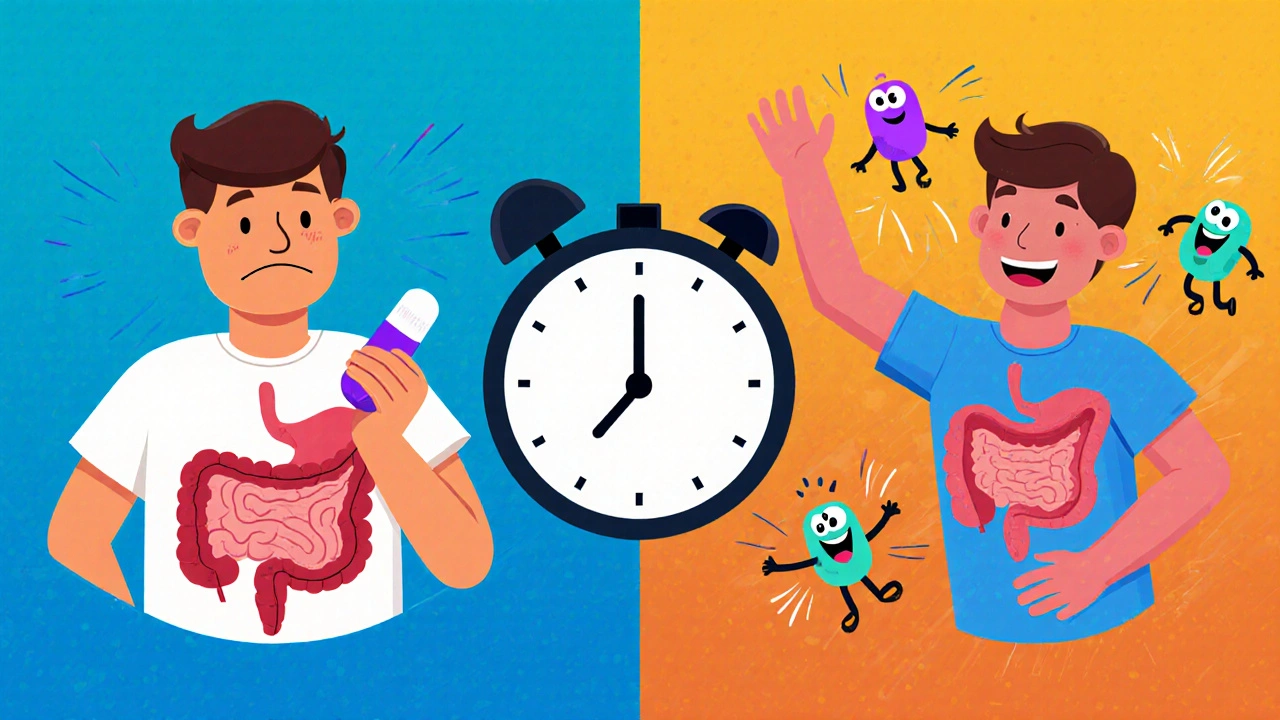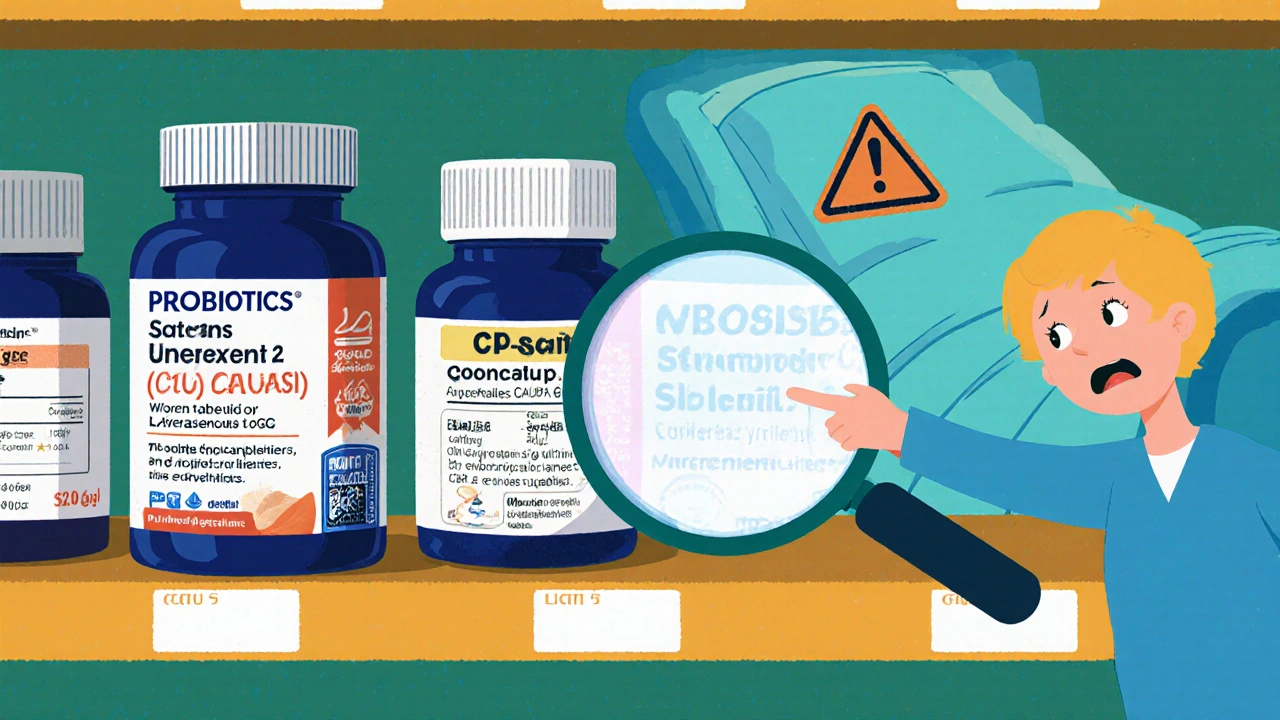
Probiotic Selector Checker
Check Your Probiotic for Antibiotic Therapy
This tool helps you determine if your probiotic meets the evidence-based criteria for reducing antibiotic-associated diarrhea, based on the research in this article.
When you’re on antibiotics, you’re not just fighting an infection-you’re also shaking up your gut. Antibiotics don’t care if bacteria are good or bad. They wipe them all out. And that’s where the trouble starts. About 1 in 5 people on antibiotics get diarrhea. For some, it’s mild. For others, it’s severe enough to land them back in the hospital. That’s not just discomfort-it’s a real risk. But there’s a simple, evidence-backed way to cut that risk in half: probiotics.
Why Antibiotics Mess With Your Gut
Your gut is home to more than 100 trillion bacteria. These tiny residents help you digest food, make vitamins, train your immune system, and keep harmful bugs from taking over. Antibiotics throw all of that out of balance. Even a short course can wipe out good bacteria that protect your intestines. Without them, harmful ones like Clostridioides difficile (C. diff) can move in and cause serious diarrhea. In hospitals, C. diff affects up to 35% of patients on antibiotics. It’s not rare. It’s common. And it’s preventable.What Probiotics Actually Do
Probiotics are live microbes-usually bacteria or yeast-that help restore balance. They don’t replace your natural gut flora. Instead, they act like temporary reinforcements. They crowd out bad bacteria, produce substances that stop harmful bugs from growing, and help your gut lining stay strong. Not all probiotics are the same. Some strains work better than others for antibiotic-related issues. The most studied and effective strains for preventing antibiotic diarrhea are:- Lactobacillus rhamnosus GG (L. GG)
- Saccharomyces boulardii (a beneficial yeast)
- Bifidobacterium lactis
Not All Probiotics Work the Same
Here’s the catch: not every probiotic supplement helps. A multi-strain product with 10 different bacteria might sound better, but research shows it’s often worse. The strongest evidence is for single-strain or two-strain formulas with proven results. L. GG and S. boulardii have been tested in dozens of trials. Other strains? Not so much. If the label doesn’t say exactly which strain it contains, you’re guessing. And guessing won’t help. Also, dose matters. Most effective studies used between 5 and 10 billion colony-forming units (CFUs) per day. Some products claim 50 billion-but that doesn’t mean more is better. In fact, too much can make bloating and gas worse before it gets better. Stick to the tested range. And don’t trust the “natural” label. Many supplements don’t even contain what they say they do. One independent test found 30% of probiotics didn’t have enough live bacteria to work. Another 15% had unknown strains mixed in. You’re not just wasting money-you could be risking side effects.When and How to Take Them
Timing is everything. Antibiotics can kill probiotics if you take them together. The solution? Space them out. Take your probiotic at least 2 to 3 hours after your antibiotic dose. That gives the antibiotic time to do its job without wiping out the good bugs you’re trying to protect. Take your probiotic daily-during and after the antibiotic course. Most experts recommend continuing for at least a week after you finish the antibiotics. That gives your gut time to recover. Some people take them longer, especially if they’ve had recurring issues. As for when to take them: it depends on the strain. L. GG works well with food. S. boulardii is acid-resistant and can be taken on an empty stomach. Check the label. If it doesn’t say, take it with a light meal to be safe.
Side Effects? Yes, But Usually Minor
Some people feel bloated, gassy, or slightly constipated when they start probiotics. That’s normal. It means your gut is adjusting. These symptoms usually fade within a few days. If they don’t, stop and talk to your doctor. There’s a small risk of infection, especially if you’re immunocompromised. There have been rare cases of bloodstream infections from Lactobacillus or Saccharomyces in people with weak immune systems, serious illnesses, or recent surgery. If you’re on chemotherapy, have HIV, an artificial heart valve, or are critically ill, don’t take probiotics without talking to your doctor first.Food vs. Supplements
Yogurt, kefir, sauerkraut, and kimchi contain probiotics. But they’re not reliable for preventing antibiotic diarrhea. The amount of live bacteria varies wildly. You’d need to eat huge amounts daily to match the dose in a supplement. And most don’t contain the specific strains proven to help. Supplements give you a controlled, measurable dose. For this purpose, they’re the better choice.What the Experts Say
The International Scientific Association for Probiotics and Prebiotics (ISAPP) says probiotics “may help mitigate bloating, cramping, and diarrhea” during antibiotic use. The CDC and the American College of Gastroenterology both acknowledge the evidence supports their use in high-risk patients. Harvard Health, Cleveland Clinic, and Mayo Clinic all list probiotics as a reasonable option for preventing antibiotic-associated diarrhea. But they all agree on one thing: talk to your doctor. Especially if you’re older, have a chronic illness, or are taking other medications. Your doctor can help you pick the right strain and avoid interactions.
What to Look for When Buying
Not all probiotics are created equal. Here’s what to check on the label:- Strain name-must include genus, species, and strain (e.g., Lactobacillus rhamnosus GG)
- CFU count-5 to 10 billion per dose
- Expiration date-live cultures die over time
- Storage instructions-some need refrigeration
- Third-party testing-look for USP, NSF, or ConsumerLab seals
Real People, Real Results
On Amazon, Culturelle (L. GG) has over 12,500 reviews with a 4.2-star rating. Many users write: “Didn’t get diarrhea like last time,” or “No more running to the bathroom.” But about 15% say it did nothing. And 10% say it made things worse-usually people with IBS or very sensitive guts. That’s why strain and dose matter. What works for one person might not work for another. Reddit threads are full of people sharing their timing tricks: “I take mine at bedtime, 3 hours after my last antibiotic.” “I started before the antibiotics and kept going for two weeks after.” These aren’t anecdotes-they’re practical applications of the science.What’s Next?
Science is moving fast. Researchers are now studying which probiotics work best with which antibiotics. For example, amoxicillin might need a different strain than clindamycin. The NIH is spending $12.5 million on this research in 2025. In the future, you might get a personalized probiotic prescription based on your gut microbiome and the antibiotic you’re taking. But for now, the best advice is simple: if you’re on antibiotics and worried about diarrhea, choose a proven strain, take the right dose, space it out, and keep going after the course ends. It’s not magic. But it’s one of the few things in medicine that actually works-and costs less than a coffee.Can probiotics prevent all antibiotic side effects?
No. Probiotics are most effective at reducing diarrhea, especially antibiotic-associated diarrhea and C. diff. They don’t prevent nausea, vomiting, or yeast infections. They also don’t make antibiotics work better against your infection. Their job is to protect your gut-not replace the antibiotic.
How long should I take probiotics after antibiotics?
Continue for at least one to two weeks after finishing your antibiotic course. Your gut microbiome takes time to recover. Stopping too soon might leave you vulnerable to diarrhea or other issues. Some people continue longer if they’ve had problems before, but there’s no need to take them indefinitely unless advised by a doctor.
Are probiotics safe for kids and elderly people?
Yes, for most healthy children and older adults. L. GG is commonly used in pediatric studies and is considered safe. For elderly patients, especially those with weakened immune systems or chronic illnesses, it’s best to check with a doctor first. The risk of infection from probiotics is low but not zero in vulnerable groups.
Can I get enough probiotics from yogurt instead of supplements?
Yogurt and fermented foods contain probiotics, but not reliably enough to prevent antibiotic diarrhea. The strains vary, the dose is unknown, and many commercial yogurts have added sugar or are heat-treated, killing the good bacteria. For this specific purpose, supplements with proven strains and verified CFUs are more effective.
Do probiotics interfere with antibiotics?
Not if you take them at the right time. Taking probiotics within 2 hours of an antibiotic can kill the probiotic bacteria before they can help. But if you space them out by 2-3 hours, the antibiotic won’t affect the probiotic, and the probiotic won’t interfere with the antibiotic’s ability to fight infection.
What if I forget to take my probiotic at the right time?
Don’t panic. If you accidentally take it with your antibiotic, just wait until your next dose and space them out properly from then on. Missing one dose won’t ruin the benefit. Consistency over days and weeks matters more than perfect timing on every single dose.
Are there any probiotics I should avoid?
Avoid probiotics if you’re immunocompromised, have a central line, recently had surgery, or are critically ill. Also avoid products without clearly listed strains or CFU counts. Stay away from unregulated brands that make wild claims like “boosts immunity” or “detoxes your gut.” Stick to well-researched strains like L. GG or S. boulardii.
8 Comments
Summer Joy
November 20 2025
OMG I HATE WHEN PEOPLE TREAT PROBIOTICS LIKE A CURE-ALL 😤 I took them with amoxicillin and still got C. diff. Like, wtf? The study says 70% reduction? Cool, but what about the 30% who still get wrecked? And don’t even get me started on the $20 bottles that have ZERO live cultures. This whole thing is a scam dressed up as science. 🤡
Aruna Urban Planner
November 20 2025
The microbiome is an ecosystem, not a battlefield. Antibiotics induce a disturbance; probiotics act as ecological buffers, not replacements. The efficacy of L. GG and S. boulardii is statistically significant, but the effect size is context-dependent-modulated by baseline microbiota composition, antibiotic class, and host immune status. A meta-analysis of RCTs shows heterogeneity in response, suggesting personalized protocols may outperform one-size-fits-all dosing. The commercialization of probiotics has outpaced mechanistic understanding. We need longitudinal microbiome mapping pre/post intervention to move beyond correlation.
Nosipho Mbambo
November 21 2025
...I just took a probiotic because my doctor said so... I don’t even know what strain... I think it’s Lacto... something... I just grab the one on sale... and I still got the runs... so... yeah... I guess it didn’t work...? 🤷♀️
Katie Magnus
November 22 2025
Probiotics? Please. My grandma ate yogurt every day and still got sick. This is just Big Pharma selling you snake oil under a cute label. If your gut can’t handle antibiotics, maybe you shouldn’t be taking them. Or maybe you’re just weak. I don’t need a supplement to tell me how to live.
King Over
November 23 2025
took saccharomyces boulardii with doxycycline. spaced it out. no issues. no drama. just works. buy the one with the strain on the bottle. done.
Johannah Lavin
November 23 2025
Y’all I just wanna say thank you for this post 💖 I’ve been on antibiotics 3x this year and each time I used L. GG and it made all the difference. I even started giving my 8-year-old a chewable one during her ear infection-no tummy troubles! 🌈 The key is consistency and reading the label. Don’t be like me last time and buy the cheap one with no strain listed. 😅 You’re worth the extra $5.
Ravinder Singh
November 23 2025
Probiotics are like planting seeds in a scorched field after a wildfire. You’re not restoring the original forest-you’re introducing resilient species that stabilize the soil until the native ones return. That’s why strain specificity matters. S. boulardii doesn’t colonize-it’s a transient diplomat, calming the inflammatory chaos. And yes, spacing is non-negotiable. Antibiotics are blunt instruments; probiotics are precision tools. Use them like it. Also, refrigerated doesn’t mean ‘premium’-it means ‘alive.’ And that’s worth paying for. 🙏






Alyssa Torres
November 19 2025
I was on antibiotics last year for a nasty sinus infection and thought I was doomed to 10 days of bathroom marathons. I started taking Culturelle (L. GG) the same day I began the script, spaced it out by 3 hours, and kept going for two weeks after. Zero diarrhea. Zero panic. I even told my mom, who’s 72, and she’s now hooked too. Probiotics aren’t magic, but they’re the closest thing to a free health hack I’ve ever found.